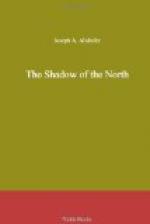A hundred yards more, and he sat down by the trunk of a great oak, convinced that no foe was near. His own five splendid senses had told him so, and the fact had been confirmed by an unrivaled sentinel hidden among the leaves over his head, a small bird that poured forth a wonderful volume of song. Were any other coming the bird would cease his melody and fly away, but Tayoga felt that this tiny feathered being was his ally and would not leave because of him. The song had wonderful power, too, soothing his senses and casting a pleasing spell. His imaginative mind, infused with the religion and beliefs of his ancestors, filled the forest with friendly spirits. Unseen, they hovered in the air and watched over him, and the trees, alive, bent protecting boughs toward him. He saw, too, the very spot in the heavens where the great shining star on which Tododaho lived came out at night and glittered.
He remembered the time when he had gone forth in the dusk to meet Tandakora and his friends, and how Tododaho had looked down on him with approval. He had found favor in the sight of the great league’s founder, and the spirit that dwelt on the shining star still watched over him. The Ojibway, whom he hated and who hated him in yet greater measure, might be somewhere in the forest, but if he came near, the feathered sentinel among the leaves over his head would give warning.
Tayoga sat nearly half an hour listening to the song of the bird. He had no object in remaining there, his errand bade him move on, but there was no hurry and he was content merely to breathe and to feel the glory and splendor of the forest about him. He knew now that the Indian nature had never been taken out of him by the schools. He loved the wilderness, the trees, the lakes, the streams and all their magnificent disorder, and war itself did not greatly trouble him, since the legends of the tribes made it the natural state of man. He knew well that he was in Tododaho’s keeping, and, if by chance, the great chief should turn against him it would be for some grave fault, and he would deserve his punishment.
He sat in that absolute stillness of which the Indian by nature and training was capable, the green of his tanned and beautifully soft deerskin blending so perfectly with the emerald hue of the foliage that the bird above his head at last took him for a part of the forest itself and so, having no fear, came down within a foot of his head and sang with more ecstasy than ever. It was a little gray bird, but Tayoga knew that often the smaller a bird was, and the more sober its plumage the finer was its song. He understood those musical notes too. They expressed sheer delight, the joy of life just as he felt it then himself, and the kinship between the two was strong.
The bird at last flew away and the Onondaga heard its song dying among the distant leaves. A portion of the forest spell departed with it, and Tayoga, returning to thoughts of his task, rose and walked on, instinct rather than will causing him to keep a close watch on earth and foliage. When he saw the faint trace of a large moccasin on the earth all that was left of the spell departed suddenly and he became at once the wilderness warrior, active, alert, ready to read every sign.




